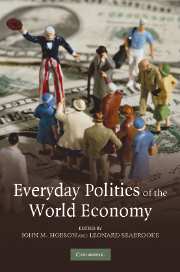Book contents
- Frontmatter
- Contents
- List of tables
- List of contributors
- Acknowledgements
- 1 Everyday IPE: revealing everyday forms of change in the world economy
- Part I Regimes as cultural weapons of the weak
- Part II Global economic change from below
- 5 The everyday social sources of imperial and hegemonic financial orders
- 6 Everyday investor subjects and global financial change: the rise of Anglo-American mass investment
- 7 Peasants as subaltern agents in Latin America: neoliberalism, resistance and the power of the powerless
- Part III Bringing Eastern agents in
- Bibliography
- Index
6 - Everyday investor subjects and global financial change: the rise of Anglo-American mass investment
Published online by Cambridge University Press: 22 September 2009
- Frontmatter
- Contents
- List of tables
- List of contributors
- Acknowledgements
- 1 Everyday IPE: revealing everyday forms of change in the world economy
- Part I Regimes as cultural weapons of the weak
- Part II Global economic change from below
- 5 The everyday social sources of imperial and hegemonic financial orders
- 6 Everyday investor subjects and global financial change: the rise of Anglo-American mass investment
- 7 Peasants as subaltern agents in Latin America: neoliberalism, resistance and the power of the powerless
- Part III Bringing Eastern agents in
- Bibliography
- Index
Summary
What's ‘new’ about contemporary global finance? Scholars in the field of international political economy (IPE) would almost certainly respond to this question by emphasising an unprecedented shift in the balance between state and market in favour of the latter (e.g., Cohen 1996; Germain 1997; Helleiner 1994; Strange 1998). This seemingly reflects what the editors suggest is a ‘regulatory straitjacket’ that dominates IPE inquiry into global finance. By contrast, my focus in this chapter is the exceptional growth of Anglo-American mass investment. Others have begun to reveal the importance to contemporary global finance of the millions of American and British investors who are habitually neglected by regulatory IPE (RIPE) inquiry (Harmes 2001a, 2001b). Yet even within this prescient work, individual investors remain portrayed as ‘weak’ and as passive dupes of the power and agency of globalising finance capital. Genuinely re-valuing mass investment in our understanding of global finance requires that everyday investment practices and investor subjects are viewed as constitutive in today's qualitatively distinct global financial order (Langley 2002a). All subjects' perceived self-interests as investors – and not just those of the financial elite – are discursively framed and manifest in their reflective practices. Accordingly, this chapter concentrates on developments in what the editors describe as ‘axiorational’ behaviour (see Chapter 1) in Anglo-American mass investment culture and how it contributes to our understanding not only of global financial change, but also of the making of everyday investor subjects.
- Type
- Chapter
- Information
- Everyday Politics of the World Economy , pp. 103 - 119Publisher: Cambridge University PressPrint publication year: 2007
- 2
- Cited by



